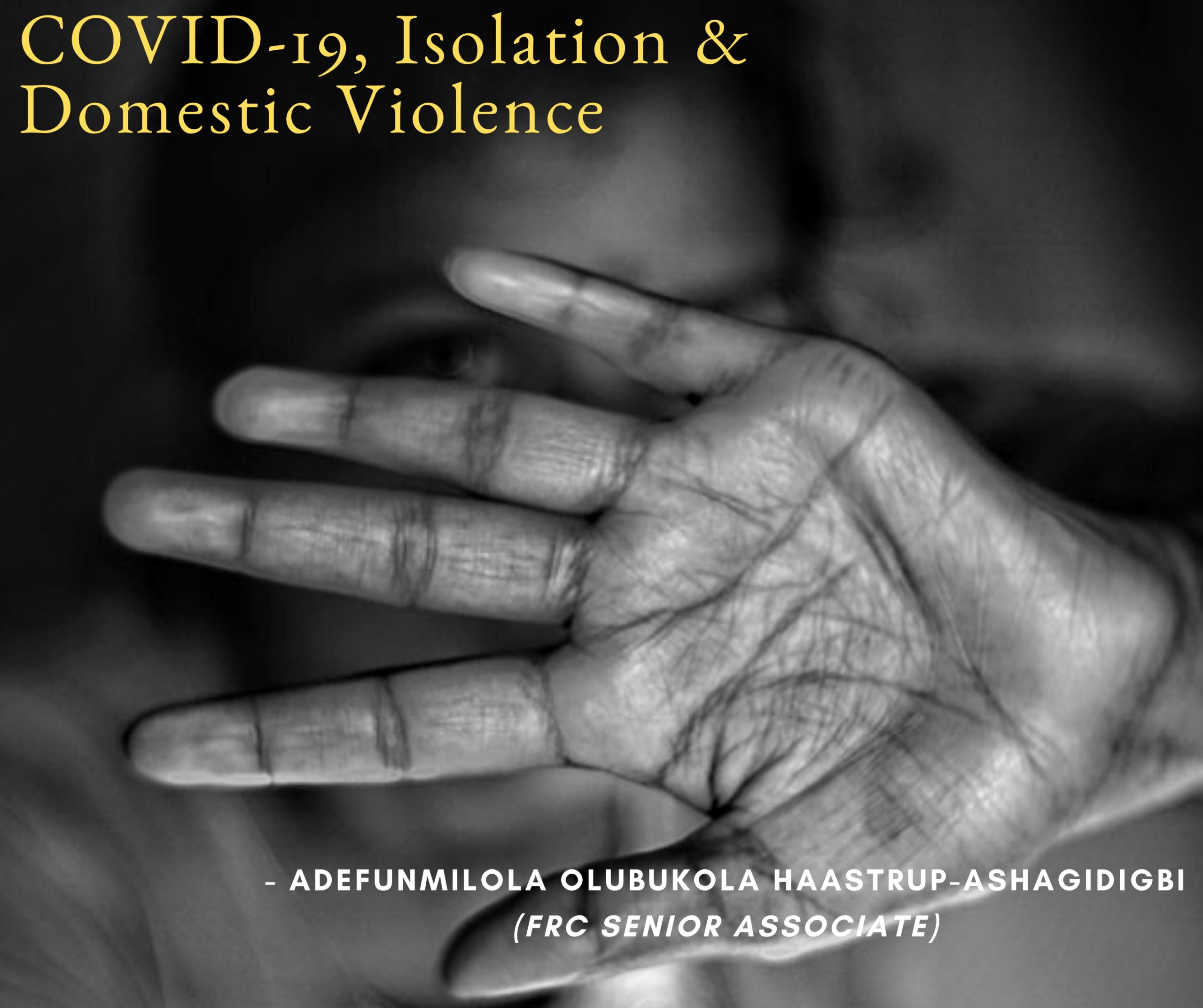
Introduction
A directive to stay at home was issued by the Federal Government of Nigeria (FGN) in a bid to curb the spread of the deadly coronavirus (COVID-19) in the country. The effort by the FGN to save lives during this pandemic inadvertently put some vulnerable group at risk -victims of domestic violence, living with their abusers. Statistics have shown that reports of domestic abuse have increased during this period. Victims are now on a full-time basis stuck in the same house/home with their abuser. The directive has taken away respites in the form of office, church, market, or neighborly visits to escape for a while and avoid the abuser. Families with otherwise great relationships are feeling the strain of being isolated together for days on end. The circumstance is worse for victims of domestic abuse, living in isolation with an abusive husband, wife, parent, etc. Imagine living in fear of the person who shares your home. Imagine that every day is a nightmare of criticism, name-calling, control, emotional, and physical violence while the world is grappling with an ongoing pandemic.
For those already in unsafe situations under the shadow of domestic violence, isolation could be very fatal. Victims, majorly women and children who live with domestic violence might not have an escape from their abusers during this quarantine.
Stay at Home Directive: An Unsafe Safety–Net
To current domestic violence victims, the stay at home directive comes as a huge paradox, as their choices of being safe are electing between the dangerous virus outside and the dangerous spouse inside. Coupled with the issues of isolation and fears of the virus, a violent abuser’s trigger will be escalated during the isolation as he/she will be faced with the ripple effects of depression, financial uncertainty, boredom, lack of control, all of which may lead to increased or aggravated occurrences of domestic abuse. Whilst the lockdown may have been eased, it is clear that the new normal will be more social distancing which includes working from home and fewer interactions at work, church, or other forums. Abusive spouses will be home more often than not, allowing more exposures to children and other members of the family.
Report on Domestic Violence
As expected, reports on domestic violence have escalated during this pandemic and calls for self-isolation. Experience from other countries like China shows a corresponding rise in the number of women reporting increased incidents from the economic impact of the lockdown such as reduced income and financial difficulties which are contributory to the violence. In India, the Childline India helpline received more than 92,000 calls between 20th March 2020 and 31st March 2020, the start of India’s lockdown, asking for protection from abuse and violence.The Gender and COVID-19 Working Group, which is a network of interdisciplinary stakeholders interested in advancing research and practice related to COVID-19 in its report on “Pandemics and Violence Against Women and Children” in Australia stated that 400 frontline workers reported 40 percent increase in calls for help.In the United Kingdom, Edinburgh live news on 6th of April, 2020 reported that Refuge, a charity concerned with domestic violence have recorded 25% increase on its National Domestic Abuse helpline since the restrictions began, a few days later Refuge reported a 700 percent increase in calls in a single day. In Georgia State, in the United States of America, a Georgian state hospital noted that there is a 15% increase of domestic violence cases in their facilities, local media and hospitals. The Coordinator of the Lagos State Domestic and Sexual Violence Response Team revealed that the State had recorded an increase in cases of abuse since the lockdown started, she noted that before the outbreak the State recorded an average of eight cases daily which has increased to about 50 percent, this has made the State introduce more helplines and also leverage on technology to assist victims of sexual abuse and domestic violence during the lockdown.
To curb this, certain countries have put together plans and actions for victims:
- In the United Kingdom, victims of domestic violence are allowed to leave home and seek safety in a shelter.
- In India, perpetrators of domestic violence are institutionally quarantined while the National Commission for Women launched a WhatsApp number for the duration of the lockdown, this would allow women contact the commission for help.
- The Italian government launched an application that allows asking for help without the need to make a phone call.
- In Australia, a COVID-19 Family and Domestic Violence Task Force was created to work with the Police force and service providers to ensure the continuation of services, as courts to impose electronic monitoring on offenders and raised penalty amounts.
- In Lagos Nigeria, the MIRABEL Centre at Lagos State University Teaching Hospital (LASUTH), Ikeja and Women at Risk International Foundation (WARIF) have been encouraged to provide essential medical and psychological support to victims of sexual violence during the lockdown.
DV Support during Lockdown in Nigeria: Important Information
- Stay in touch with family and friends and the community. A code word that signals to friends and the community around are a good mode of communication.
- For victims in Lagos, have the emergency number of the Lagos State Domestic and Sexual Violence Response Team (DSVRT) – 08137960048 on speed dial.
- The Lagos State Government has also provided the numbers to reach out to for its citizens; The Office of the Public Defender: 07080601080, Ireti Resource Center- 07003333111, Mirabel – 08155770000, WARIF- 0809210009, Stand to End Rape- 08095967000, Primary Health Care Board- 08033865296.
- Explore the option of counseling to deal with psychological issues. Speak with a psychologist.
At the end of the day, a tough decision may have to be made by victims. There are more permanent solutions to get out of a domestic violence situation, and guarantee the safety of victims and their loved ones. Legally, the options of Divorce, Separation, or Desertion, amongst others, exist to assist victims to live a more stable and safe life. With the assistance of a good family lawyer, an abuser can obtain full separation from an abusive spouse, obtain custody of children, as well as child support/maintenance costs.
It will be wise to speak to an experienced family lawyer or counselor at this time to understand more of the options open to victims, and permanent solutions to a bad and possibly life-threatening situation.
Stay Safe
Written by
Adefunmilola Olubukola Haastrup-Ashagidigbi (Mrs.) LLB, BL, LLM, ACIArb, APNM, ACIS.
……………………………………………………………………………………………………………………………………………………………………………………………………………………………………………..
Follow FRC on Social Media: Linkedin | Facebook | Twitter | Instagram
Send FRC a mail via: info@funmirobertsandco.com
Call: Lagos: +234-902-079-0815 || Ibadan: +234-803-806-3543






Recent Comments